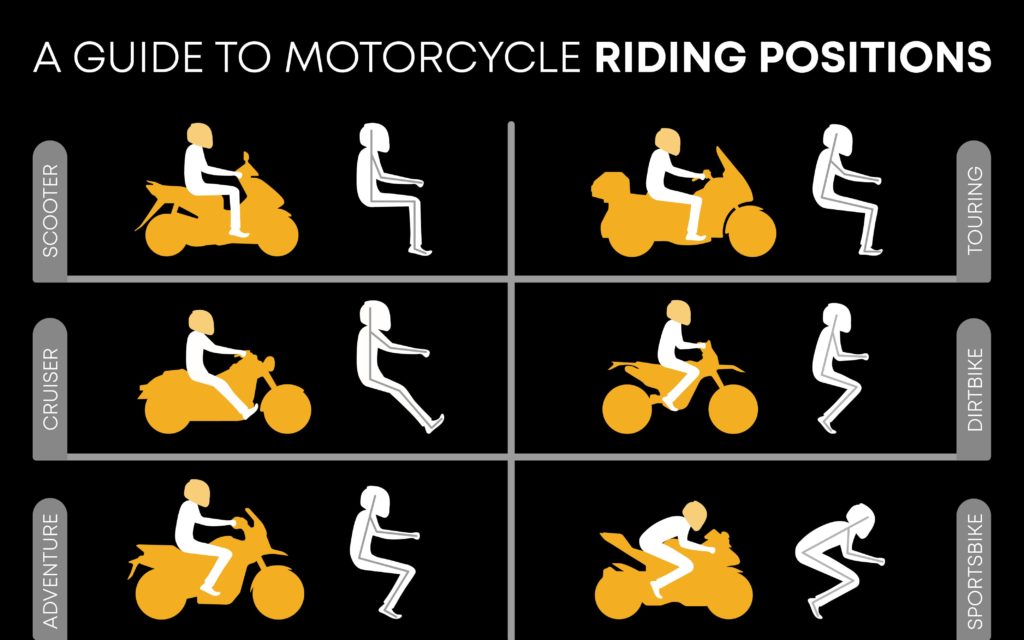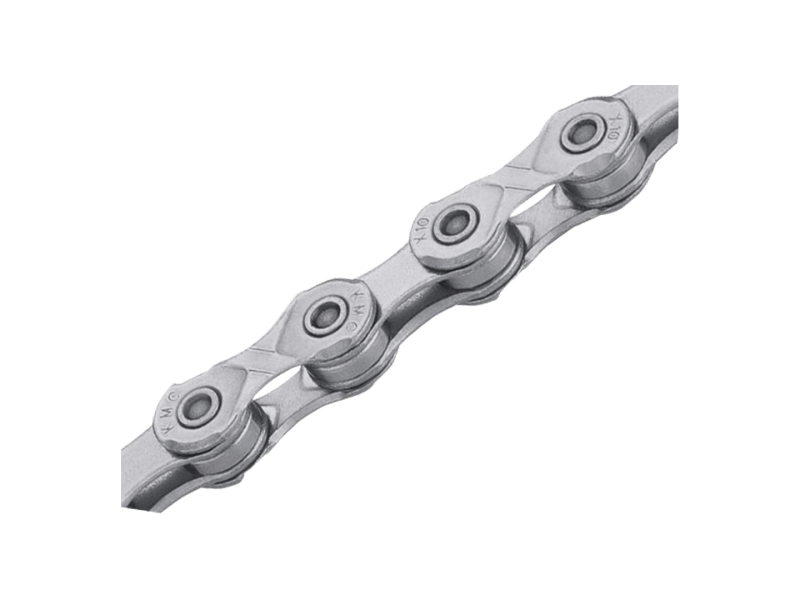The three main motorcycle riding positions are standard, sport, and cruiser. Each offers distinct benefits and drawbacks.
Motorcycle riding positions significantly impact comfort, control, and overall riding experience. The standard position, also known as upright, provides a balanced and versatile option suitable for various riding conditions. Riders sit with a straight back, and feet positioned directly below, offering good control and comfort.
The sport position leans the rider forward, enhancing aerodynamics and control at high speeds, ideal for aggressive riding. The cruiser position features a reclined posture with feet forward, prioritizing comfort on long rides. Understanding these differences helps riders choose the best motorcycle type for their needs and preferences.
Introduction To Riding Positions
Motorcycle riding positions are crucial for safety and comfort. Different bikes have different riding positions. Understanding these positions can enhance your riding experience. Let's dive into the importance of these positions.
Importance Of Position
The riding position affects your balance and control. A good position helps you ride longer without fatigue. It also improves your visibility on the road. Here are some key points:
- Stability: Ensures you stay steady on the bike.
- Control: Helps you handle the bike better.
- Visibility: Allows you to see hazards early.
Comfort Vs. Control
Comfort and control are both important but often conflict. A relaxed position may reduce control. Conversely, a more aggressive stance can increase fatigue. Consider these factors:
| Aspect | Comfort | Control |
|---|---|---|
| Handlebar Height | Higher bars for relaxed arms. | Lower bars for better control. |
| Foot Peg Position | Forward pegs for comfort. | Rearward pegs for control. |
| Seat Height | Lower seat for comfort. | Higher seat for better control. |
Finding the right balance is key. Choose a position that suits your riding style. Test different setups to find what works best for you.

Credit: girlingear.home.blog
Standard Riding Position
The standard riding position is popular among motorcycle enthusiasts. It offers a balanced mix of comfort and control. This position is suitable for a wide range of riding styles and terrains.
Characteristics
The standard riding position features a few key characteristics:
- Upright posture: The rider's back is straight, reducing strain.
- Neutral foot placement: Feet rest directly below the hips.
- Relaxed arms: Hands grip the handlebars without stretching.
- Balanced weight distribution: Weight is evenly spread across the seat.
Best Uses
The standard riding position excels in several scenarios:
| Scenario | Reason |
|---|---|
| City commuting | Offers visibility and quick maneuverability. |
| Long rides | Provides comfort for extended periods. |
| Casual cruising | Ensures a relaxed and enjoyable ride. |
Sport Riding Position
The sport riding position is crucial for high-performance motorcycle enthusiasts. This posture enhances control and stability, especially at high speeds. It's essential for riders who love the thrill of speed and precision.
Features
The sport riding position involves a forward-leaning posture. Your body weight shifts towards the front wheel. This position offers better aerodynamics. The rider's knees grip the fuel tank tightly. Feet are placed on rear-set footpegs, positioned higher and further back.
- Forward-leaning posture
- Weight shifted to the front
- Aerodynamic advantage
- Knees grip the fuel tank
- Rear-set footpegs
Performance Benefits
The sport riding position offers numerous performance benefits. It lowers wind resistance, allowing faster speeds. The forward lean improves control and stability during cornering. Rear-set footpegs provide better leverage for quick maneuvers. The position also enhances rider feedback, providing a better sense of the road.
| Benefit | Description |
|---|---|
| Lower Wind Resistance | Allows faster speeds with less effort |
| Improved Control | Better stability during cornering |
| Better Leverage | Ideal for quick maneuvers |
| Enhanced Feedback | Provides a better sense of the road |
This position is ideal for track racing and spirited riding. It demands physical fitness and endurance due to its aggressive nature. Riders who master this position enjoy a thrilling and rewarding experience.

Credit: damon.com
Cruiser Riding Position
The cruiser riding position is one of the most iconic in the motorcycle world. It offers a relaxed and comfortable stance, making it popular among many riders. This position typically involves a low seat, forward foot pegs, and higher handlebars.
Attributes
The cruiser riding position boasts several unique attributes:
- Relaxed Posture: The rider sits upright with a straight back.
- Forward Foot Pegs: Legs stretch forward, reducing knee strain.
- High Handlebars: Arms are slightly raised, ensuring a comfortable grip.
- Low Seat Height: Provides a lower center of gravity, enhancing stability.
Long-distance Comfort
Cruiser motorcycles are designed for long journeys. They offer unparalleled comfort over extended distances. Here are some reasons why:
- Ergonomic Design: The seating position minimizes back and shoulder fatigue.
- Seat Cushioning: Plush seats provide excellent support during long rides.
- Wind Protection: Many cruisers come with windshields to reduce wind fatigue.
- Vibration Dampening: Advanced suspension systems absorb road bumps and vibrations.
| Attribute | Benefit |
|---|---|
| Relaxed Posture | Minimizes muscle strain |
| Forward Foot Pegs | Improves leg comfort |
| High Handlebars | Reduces shoulder tension |
| Low Seat Height | Enhances control |
Overall, the cruiser riding position is perfect for those who love long, leisurely rides. It combines comfort, control, and style in one package.
Off-road Riding Position
The off-road riding position is crucial for navigating rough terrains. It ensures better control and stability. Riders must adapt to varying conditions.
Key Elements
Mastering the off-road riding position involves understanding key elements. These elements enhance your riding experience and safety.
- Standing Up: Stand on the foot pegs for better shock absorption.
- Body Position: Keep your body centered and slightly forward.
- Knees and Elbows: Bend your knees and elbows for flexibility.
- Head and Eyes: Look ahead to anticipate obstacles.
- Grip: Hold the handlebars lightly but firmly.
Terrain Adaptability
Adapting to different terrains is key for off-road riding. Each terrain type demands unique adjustments.
| Terrain | Position Adjustments |
|---|---|
| Loose Sand | Lean back to keep the front wheel light. |
| Mud | Maintain momentum and keep a steady throttle. |
| Rocky Paths | Stand up and use your legs as shock absorbers. |
| Steep Hills | Lean forward when climbing, backward when descending. |
Each terrain requires specific techniques to navigate safely. Practicing these adjustments improves your off-road skills significantly.
Touring Riding Position
The touring riding position is tailored for long-distance journeys. It emphasizes comfort and control. Riders can travel extended distances without fatigue. This position offers a relaxed posture, making it ideal for extended trips.
Core Aspects
The core aspects of the touring riding position focus on rider comfort and ergonomics. Let's break it down:
- Upright Posture: The rider sits upright, reducing back strain.
- Foot Placement: Feet are positioned directly below the hips.
- Handlebar Position: Handlebars are higher and closer to the rider.
- Seat Design: Seats are wider and cushioned for comfort.
| Aspect | Description |
|---|---|
| Posture | Upright, reducing strain on the back |
| Foot Placement | Directly below hips for balanced support |
| Handlebar Position | Higher and closer to the rider |
| Seat Design | Wider and cushioned for long rides |
Extended Travel
For extended travel, the touring riding position excels. This position supports the rider during long journeys. Key benefits include:
- Reduced Fatigue: The upright position reduces muscle strain.
- Improved Visibility: Higher seating offers better road visibility.
- Enhanced Comfort: Padded seats provide comfort for long hours.
- Easy Control: Handlebars are positioned for easy reach and control.
These benefits make touring bikes ideal for cross-country trips. Riders can enjoy the journey without discomfort.
Adjusting Your Position
Adjusting your riding position is crucial for comfort and control. It affects your balance and safety on the road. Whether you're a new rider or experienced, tweaking your position can make a big difference.
Personal Preferences
Every rider has unique needs. Some like a relaxed posture, others prefer an aggressive stance. Find what feels right for you. Test different positions to see which gives the best control and comfort.
- Relaxed Posture: Great for long rides. Keeps your back straight.
- Aggressive Stance: Ideal for sport riding. Puts you in a forward-leaning position.
- Neutral Position: Balanced. Suitable for everyday riding.
Remember, your position can change with the type of ride. Long trips and short commutes may require different setups.
Bike Modifications
Sometimes, your bike may need adjustments to match your preferred position. Here are some common modifications:
- Handlebars: Adjust or replace for better reach.
- Foot Pegs: Move them to a more comfortable spot.
- Seat: Choose one that supports your back.
Handlebars: Adjusting handlebars can help you lean forward or sit upright.
| Type | Benefit |
|---|---|
| Clip-ons | Lower position for sport riding. |
| Risers | Higher position for a relaxed ride. |
Foot Pegs: Adjusting foot pegs can ease knee strain and enhance control.
Seat: A good seat can reduce back pain and improve your ride quality.
These modifications can make your bike feel like an extension of your body.

Credit: www.researchgate.net
Choosing The Right Position
Finding the perfect motorcycle riding position can enhance your comfort and safety. It also affects your control over the bike. The right position depends on various factors, including your riding style and body type. Let's explore these factors in detail.
Riding Style
Your riding style plays a crucial role in determining the best position. Different styles include commuting, touring, racing, and off-road riding. Each style requires a unique posture for optimal performance and safety.
- Commuting: An upright position is ideal. It provides good visibility and comfort.
- Touring: A relaxed, slightly reclined posture helps in long-distance comfort.
- Racing: A forward-leaning position reduces wind resistance and enhances control.
- Off-road: A standing or semi-standing position offers better balance and control on rough terrains.
Body Type Considerations
Your body type also influences the ideal riding position. Key factors include height, weight, and flexibility. Here's a breakdown:
| Body Type | Recommended Position |
|---|---|
| Tall Riders | Upright or slightly forward-leaning for better control. |
| Short Riders | Upright position with adjustable footpegs and handlebars. |
| Heavy Riders | Reclined position to distribute weight evenly. |
| Flexible Riders | Forward-leaning for racing or off-road activities. |
Consider these factors to find the most comfortable and efficient riding position. This will enhance your riding experience significantly.
Frequently Asked Questions
What Are The Different Motorcycle Riding Positions?
There are three main riding positions: standard, sport, and cruiser. Each offers a unique experience. Standard is upright, sport is aggressive, and cruiser is relaxed.
Which Riding Position Is Best For Beginners?
Standard riding position is best for beginners. It offers a balanced and comfortable experience. It's easy to handle and versatile.
How Does Sport Position Affect Riding?
Sport position improves aerodynamics and control. It allows for aggressive riding. However, it can be uncomfortable for long rides.
Is Cruiser Position Good For Long Rides?
Yes, cruiser position is excellent for long rides. It provides maximum comfort. The relaxed posture reduces fatigue.
Conclusion
Choosing the right motorcycle riding position enhances comfort and control. Experiment with different styles to find your perfect fit. Prioritize safety and ergonomics for an enjoyable ride. Remember, the best riding position is one that suits your body and riding style.
Stay safe and enjoy the open road!

No comments:
Post a Comment